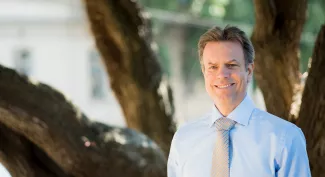Biography
Deuse earned his medical degree from the University of Würzburg in Germany. He received advanced training in heart and lung surgery at the University Hospital of Munich and University Heart Center Hamburg. After obtaining board certification in Germany as a heart surgeon, he completed a fellowship in lung and heart-lung transplantation with Stanford Medicine.
After returning to Germany in 2009, Deuse was appointed director of heart and lung transplantation at the University Heart Center Hamburg. He achieved international acclaim for his development of innovative approaches to heart failure surgery, most notably minimally invasive techniques for implanting ventricular assist systems. He also demonstrated that high success rates could be achieved in mitral valve repair utilizing fully robot-assisted endoscopic surgery. Also known as keyhole surgery, this approach has many benefits for the patient, including substantially reduced postsurgical pain, shorter hospital stays and faster recovery.
Deuse has received numerous honors, including election to the board of directors of the International Society for Heart and Lung Transplantation.
Education
| Institution | Degree | Dept or School | End Date |
|---|---|---|---|
| University of California | Diversity, Equity, and Inclusion Champion Training | 2019 |
Collaboration Interests
I am interested in:
- physician scientist
Clinical Expertise
Minimally Invasive Mitral Valve Surgery
Minimally Invasive Aortic Valve Surgery
Minimally Invasive Atrial Septal Defect (ASD) Closure
Aortic Valve Repair & Replacement
Acute Aortic Dissection Repair
Heart Transplantation
Lung Transplantation
Ventricular Assist Devices (VAD)
Ventricular Aneurysm
Arrhythmia
Coronary Artery Bypass Grafting (CABG)
Off-Pump Coronary Artery Bypass (OPCAB)
Program Affiliations
UCSF Heart & Vascular Center
In the News
Grants and Funding
- Hypo-immunogenic cardiomyocytes for myocardial repair | NIH | 2018-08-01 - 2022-06-30 | Role: Principal Investigator
- Microgravity as model for immunological senescence and its impact on tissue stem cells and regeneration | NIH | 2017-06-15 - 2022-06-30 | Role: Co-Principal Investigator
- Microgravity as model for immunological senescence and its impact on tissue stem cells and regeneration | NIH | 2017-06-15 - 2020-02-29 | Role: Co-Principal Investigator
Research Narrative
Dr. Deuse's research is focused on vascular biology and pathophysiology. His group was the among the first to elucdiate the novel pathways involved in the development of vascular intimal hyperplasia. Myointimal hyperplasia is a pathological process of the vascular system characterized by abnormal proliferation of smooth muscle cells of the vascular wall that leads to luminal obliteration and subsequent ischemia.
Myointimal hyperplasia may occur in patients after vessel injury during medical procedures (e.g. after balloon dilation or stent placement) or after pathological injury of the blood vessel (e.g. due to inflammation or toxic exposure). It can cause bypass graft failure and in-stent restenosis. To help prevent this and increase the success of treatments for vascular disease including coronary heart disease, his research group is working on the development of new preventive drug regimes and strategies.
Research Interests
Vascular Biology
Stem Cell Immunobiology
Transplant Immunology
Oxidative Stress and Apoptosis
Pulmonary Hypertension
Publications
- Orthotopic aortic transplantation: a rat model to study the development of chronic vasculopathy.| | PubMed
- Transcatheter aortic valve implantation in a heart transplant recipient: a case report.| | PubMed
- Immunogenicity and immunomodulatory properties of umbilical cord lining mesenchymal stem cells.| | PubMed
- Sustained inhibition of epsilon protein kinase C inhibits vascular restenosis after balloon injury and stenting.| | PubMed
- Review of heart-lung transplantation at Stanford.| | PubMed
- Non-volume-loaded heart provides a more relevant heterotopic transplantation model.| | PubMed
- Heterotopic and orthotopic tracheal transplantation in mice used as models to study the development of obliterative airway disease.| | PubMed
- Asymptomatic infection with novel influenza A/H1N1 virus in a heart transplant recipient.| | PubMed
- Mechanisms behind local immunosuppression using inhaled tacrolimus in preclinical models of lung transplantation.| | PubMed
- Changing trends in infectious disease in heart transplantation.| | PubMed

